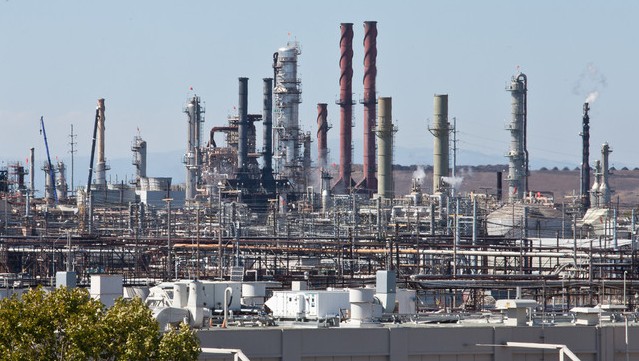Environmental groups suggested those conditions and Chevron is appealing them.
The oil company has, however, agreed to a plan submitted by Attorney General Kamala Harris, and included in the EIR as Alternative 11. That alternative, unlike Chevron’s original proposal, would reduce how much sulfur the refinery could process, and would not increase greenhouse gas emissions. Chevron’s preferred plan would have allowed an increase in greenhouse gas emissions to be offset by carbon credits.
The company has also agreed to double community investment dollars over the next decade, to $60 million.
That would benefit all Richmond residents, said Chevron employee Suzanne Jackson. “A cleaner, newer, safer refinery will continue to support the bridge of the gap between social and economic change here in Richmond,” she said.
Planning Commission Approval
Earlier this month, Richmond’s planning commission approved the environmental impact report for the project, recommending the city council approve Alternative 11.
“This was a good project before, it’s a really great project now, so we’re very hopeful,” said Chevron spokeswoman Melissa Ritchie. “Greenhouse gas emissions will not increase as result of project, they will actually decrease.”
The planning commission also set forth a series of conditions proposed by environmental groups, and Chevron has appealed all of them.
One condition would require stricter pollution emission standards, the second would require a more thorough upgrade of parts of the refinery that handle highly corrosive high-sulfur crude oil, and the third would require the company to participate in “climate justice mitigation,” reportedly including a clean-energy jobs program.
Staff for the city council oppose those conditions, saying they are outside the scope of the EIR, or outside the jurisdiction of the city.
Another Lawsuit?
Without those additional conditions, Andrés Soto from CBE says he’s concerned Chevron’s lower emissions goals would be unenforceable.
“It just doesn’t have any teeth in it,” Soto said, of the possibility of adopting the lower-emissions scheme without the additional conditions. “We think not only would it be the wrong decision, we think it would be legally challengeable.”
If so, this would not be the first time Chevron’s refinery project went to the courts.
The project, called a modernization by the company and an expansion by its detractors, is a scaled-down version of an earlier proposal. That one was approved both by the Richmond planning commission and the city council in 2008, before environmental groups including Communities for a Better Environment successfully sued to stop it.
The city council plans to decide on the fate of the project at a meeting next week.
